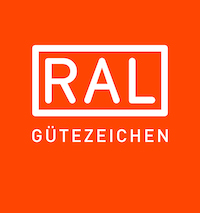RAL Registrations are quality-enhancing, technical testing standards or other classification regulations for products and services. They can generally be recognised by the designation “RAL-RG” and the corresponding number. RAL Registrations are a voluntary commitment by the relevant industrial sector. They are used in sectors in which continuous development processes need to be quickly adapted to the regulations.
In addition, they serve as internal regulations within the industrial sector: In the relationship between customer and supplier, companies can agree to meet specific requirements by stating a “RAL-RG number”. It is thus not necessary to define specific technical terms and conditions in each individual case and this simplifies the cooperation process. RAL includes those professional and trade groups directly affected by the regulations such as manufacturers, the retail trade and authorities in the process for creating RAL Registrations. RAL Registrations can also be a preliminary step towards a RAL Quality Mark (Gütezeichen). In numerous cases, internal regulations within a sector are firstly introduced in the from of RAL Registrations. After creating a legal framework through the foundation of a Quality Assurance Association, it is then easy to create a RAL Gütezeichen (Quality Mark) as proof of continuously and independently controlled quality.
The advantages of RAL Registrations at a glance:
- RAL Registrations stand for standardised and technical quality specifications for products and services.
- They can be quickly adapted to meet the latest technical changes and developments.
- RAL Registrations – which are requested by industry and developed together with those professional and trade groups affected – represent reliable and neutral regulations within an industrial sector.

